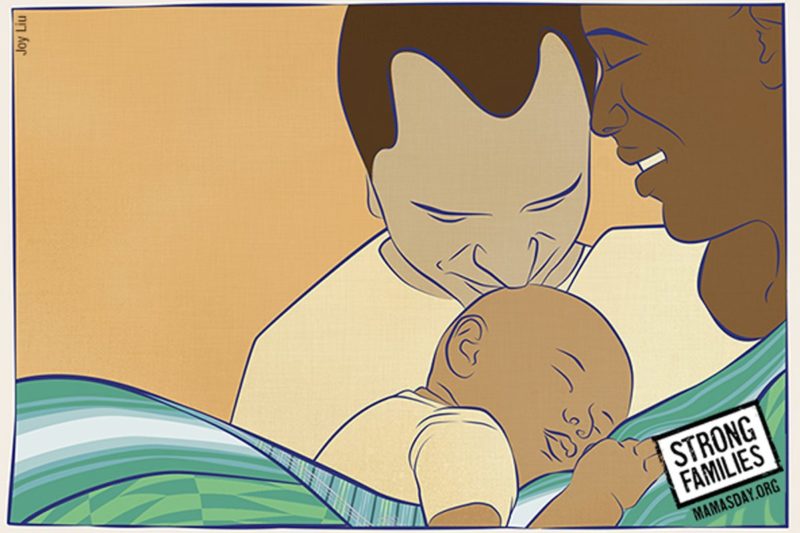Breastfeeding on This Side of Trauma
Breastfeeding advocates often say the "breast is best." But it's time for the movement to recognize it's not that simple—or painless—for women who have experienced trauma.

A house is not a haven when a new mother cannot breastfeed her infant without facing jealousy, domestic violence, and trauma. Yet that’s just what a Minnesota mom faced in February when her shotgun-wielding partner, driven by patriarchal rage and how much time she spent with their baby, threatened to kill them both.
This case reminds us that some women don’t always feel safe when it comes to breastfeeding. Stories about intimate partner jealousy and violence are prevalent in breastfeeding support groups and blogs. But there’s little recognition among advocates of breastfeeding bliss and in their visibility campaigns that breastfeeding may not be an option for women traumatized by ongoing or past violence. By recognizing the trauma women face and doing more to educate parents, including potentially jealous partners, on the importance of supporting new moms, advocates can help to build safer havens for families regardless of how an infant is nurtured.
New fathers and partners are sometimes jealous when their significant others begin feeding their infants from the breast. A partner may try to persuade the mother to stop breastfeeding or may create distance. This can lead to postpartum depression not only for the mother, but also for her partner. Unfortunately, there has been very little research associating intimate partner abuse or violence with breastfeeding and as a community, advocates for new mothers have not addressed this issue adequately.
For many, the breast is not a sign of nurture and care within our homes but a reminder that women still do not own the right to their own bodies. For women of color, this is especially harmful, as we are not only navigating generational trauma but also face barriers to maternal health education. African-American women and Latinas experience higher rates of intimate partner violence and abuse, up to 35 percent more than white women, making the intimacy of breastfeeding and nurturing an infant much more difficult.
Many breastfeeding advocates tend to erase this reality. When mothers of color decide not to nurse their babies, whether that’s due to shame, pain, or stigma after trauma, that doesn’t mean they don’t love their babies or want to provide the best nutrition possible. It’s just that putting baby to breast after physical abuse can be a trigger or pose a new set of challenges for women who have faced bodily threat.
A recent study shows that violence and abuse continue to impact breastfeeding rates because body positivity and autonomy become trivialized in the face of violence. While this study does not focus on women of color, a report from the White House Council on Women and Girls shows that women of color are disproportionately affected by trauma and are experiencing disparities in breastfeeding.
The breastfeeding movement has gotten a number of things right: increased awareness; better nutrition for children in communities of color; and inclusive and accessible public spaces for nursing mothers.
Much of the breastfeeding advocacy movement directs its energy toward creating friendly spaces and mom zones in public arenas. In New York, “Breastfeeding Welcome Here” signs invite mothers to enjoy a healthy, sanitary environment to feed infants. Those signs are even available in Haitian Creole, Spanish, and Arabic. In New Mexico, students advocated for lactation stations in high schools and colleges so they may pump milk while still getting an education. Indeed, this campaign is an international one, signaling the world is finally catching up with the facts.
As mothers, we know how amazing breastfeeding can be for a mother-baby duo. But doing so should not trump the mental health and well-being of the woman doing the breastfeeding. Putting pressure on mothers to breastfeed when she is experiencing trauma is not healthy for her or for baby, either.
It’s better to support new moms in feeding babies the healthiest, safest way possible, whether that means breastfeeding, pumping milk and feeding by bottle, or choosing to use formula.
Moreover, the breastfeeding movement needs lactation consultants and family counselors who can speak to issues of jealousy, gender violence, and trauma. Including partners in breastfeeding education and support can help new fathers or partners feel more involved in the parenting process and can alleviate some of the symptoms of jealousy.
Some organizations have worked to help breastfeeding professionals better understand the needs of sexual assault survivors while breastfeeding. Is the broader movement upholding these principles in advocating for survivors while breastfeeding?
These interconnected issues cannot be addressed in silos or campaigns that only push for public breastfeeding. Rather, they need to be addressed in our most private spaces—our homes—to make those homes places of healing.
For those experiencing intimate partner abuse or violence, you can call the National Domestic Violence Hotline for support, resources, and advice for your safety, at 1-800-799-SAFE (7233).
